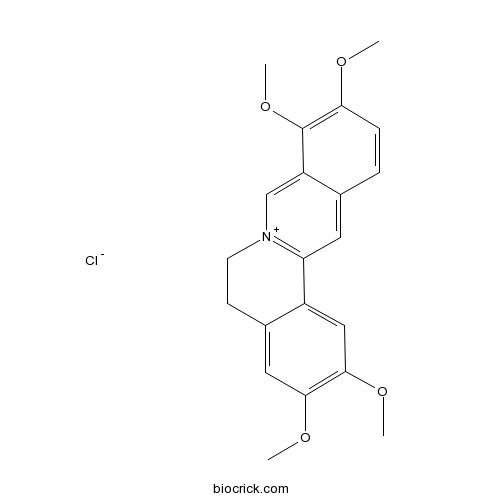| Catalog No. | BCN5914 |  |
|
| CAS RN | 10605-02-4 | ||
| Molecular Weight | 387.86 | ||
| Molecular Formula | C21H22ClNO4 | ||
| Database | [PubChem]:382153009 [ChEBI]: [PCIDB]: |
||
InChI=1S/C21H22NO4.ClH/c1-23-18-6-5-13-9-17-15-11-20(25-3)19(24-2)10-14(15)7-8-22(17)12-16(13)21(18)26-4;/h5-6,9-12H,7-8H2,1-4H3;1H/q+1;/p-1
Palmatine hydrochloride (PaH), a naturally occurring photosensitizer isolated from traditional Chinese medicine (TCM), can induce remarkable cell apoptosis ,significantly increase intracellular ROS level and significantly kill breast cancer MCF-7 cells; it also has potential in photodynamic therapy on colon adenocarcinoma.[1,2]
Palmatine Hydrochloride has anti-C. albicans effect, the effect is mainly influenced by the growth rate constant (k(2)) and maximum power output P(m)(2) of phase II; it mixes with berberine hydrochloride elicit antifungal activities and could be used to treat M. canis in rabbits. [3,4]
The quenching mechanism of palmatine hydrochloride (PMT)on bovine hemoglobin (BHb) is a static process, the electrostatic force played an important role in the conjugation reaction between BHb and PMT. [5]
Palmatine Hydrochloride treatment can reduce blood sugar and oxidative stress in STZ induced diabetic rats.[6]
English website: Palmatine hydrochloride
Japanese website: Palmatine hydrochloride
Chinese website: Palmatine hydrochloride
[1] Juan Wu, Qicai Xiao, Na Zhang,et al. Photodiagn Photodyn , 2016,7.18.
[2] Wu J, Xiao Q, Zhang N, et al. Photodiagn Photodyn , 2016, 15:53-8.
[3] Kong W, Zhao Y, Wang J, et al. Acta Chim Sin Chinese Edition, 2009, 67(21):2511-6.
[4] Xiao C W, Ji Q A, Wei Q, et al. Bmc Complem Altern M, 2015, 15(1):1-15.
[5] Liu B, Yan X, Cao S, et al. Lumin J Biol Chem Lumin, 2014, 29(3):211-8.
[6] Z Pakseresht, P Norouzi, V Hojati , et al. ZUMS Journal. 2016; 24 (107) :119-29.
[7] Xiang L I, Liu G Y, Jian-Li M A, et al. Pharm J Chinese Peoples Liberation Army, 2013(05):458-60.


